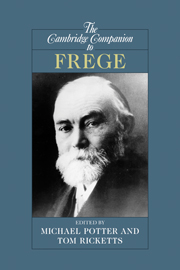Book contents
- Frontmatter
- 1 Introduction
- 2 Understanding Frege’s project
- 3 Frege’s conception of logic
- 4 Dummett’s Frege
- 5 What is a predicate?
- 6 Concepts, objects and the Context Principle
- 7 Sense and reference: the origins and development of the distinction
- 8 On sense and reference: a critical reception
- 9 Frege and semantics
- 10 Frege’s mathematical setting
- 11 Frege and Hilbert
- 12 Frege’s folly: bearerless names and Basic Law V
- 13 Frege and Russell
- 14 Inheriting from Frege: the work of reception, as Wittgenstein did it
- Bibliography
- Index
- Series List
14 - Inheriting from Frege: the work of reception, as Wittgenstein did it
Published online by Cambridge University Press: 28 September 2010
- Frontmatter
- 1 Introduction
- 2 Understanding Frege’s project
- 3 Frege’s conception of logic
- 4 Dummett’s Frege
- 5 What is a predicate?
- 6 Concepts, objects and the Context Principle
- 7 Sense and reference: the origins and development of the distinction
- 8 On sense and reference: a critical reception
- 9 Frege and semantics
- 10 Frege’s mathematical setting
- 11 Frege and Hilbert
- 12 Frege’s folly: bearerless names and Basic Law V
- 13 Frege and Russell
- 14 Inheriting from Frege: the work of reception, as Wittgenstein did it
- Bibliography
- Index
- Series List
Summary
INTRODUCTION
We might compare Wittgenstein's relation to Frege with Frege's own relation to Kant. Frege's conception of arithmetic developed in great part as a critical response to Kant's, but he wanted it to be quite clear that his criticisms were not those of a petty fault-finding spirit vis-à-vis 'a genius to whom we must all look up with grateful awe' (GI, S89). In Frege's criticisms of Kant one can see his sense that the pursuit of issues raised by Kant must be of the greatest value. He attempted to hold on to Kant's insights, sharpening them when he could, and removing what he took to be extraneous or in tension with Kant's most fruitful ideas. It is precisely that combination of great respect and deeply serious criticism, criticism the seriousness of which is itself expressive of respect, which we find mirrored in Wittgenstein's relation to Frege.
Throughout his life, Wittgenstein was enormously influenced by Frege. Frege’s writings shaped, to a great extent, the problems Wittgenstein confronted in his own thought – and not just the problems, but also methods of approach, and ideas about what could count as a satisfactory solution. Frege’s courage as a philosopher clearly inspired Wittgenstein; his own conception of what philosophy might demand of one reflects his view of Frege’s response to those demands.
- Type
- Chapter
- Information
- The Cambridge Companion to Frege , pp. 550 - 601Publisher: Cambridge University PressPrint publication year: 2010
- 4
- Cited by



